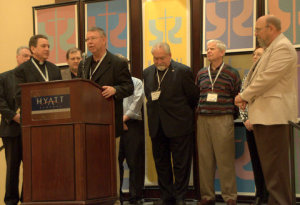Witnesses to the World || April 19-22, 2010—Tampa, Florida
Documents
Seminars
- Ecumenism 101
Dr. Thomas Ferguson (TEC) and
Dr. Michael Trice (ELCA)
This seminar is for all those who are new to the formal structures of the ecumenical movement. It provides a brief history and introduction to the movement, context for current dialogues, overview of national and international ecumenical conversations, and a sampling of new and emerging discussions. The presentation will draw on the attendees’ experience of ecumenical engagement and will encourage conversation and interaction.
- Ministry: A Retrospective on the Impact of Baptism, Eucharist and Ministry
Rev. Dr. Joe Small (PCUSA)
This seminar is the third in a three-year series on “Baptism, Eucharist, and Ministry,” Faith and Order Paper No. 111 issued by the World Council of Churches in 1982. This year’s focus will be on the theological and practical implications of Ministry. Among items to be discussed is whether increased mutual understanding expressed in the statement may allow some churches to recognize each other’s order(s) of ministry and exchange ministers when such might further the mission of the church.
- Racism as an Impediment to Ecumenism
Bp. Hope Morgan Ward (UMC)
Jane Oasin (TEC)
Curtis Kearns (PCUSA)
This seminar is the second of a multiworkshop series on dismantling racism in our churches as we seek to live faithfully into God’s gift of unity. It will explore the implications of racism to Christian unity from the Caucasian perspective and the various resources our communions have to share as we seek to live into God’s admonition to act justly, to love mercy and walk humbly with our God.
- The Origin of the Modern Ecumenical Movement – The 100th Anniversary of the Edinburgh Conference
Rev. Dr. Steven Bevans, SVD (RC)
This seminar highlights the 1910 World Missionary Conference, held in Edinburgh, Scotland, convened to study missionary endeavors in light of the circumstances of the day. By creating the International Missionary Council, the Conference affirmed the ideal of evangelization of the world in its generation, as stated by the conference organizer, J. R. Mott. Over 1200 delegates from around the world participated, representing many Christian bodies, including 160 Missionary Boards or Societies. Conference subjects included: carrying the Gospel to the non-Christian world, the local church in situations of mission, education, non-Christian religions, missionary training, church-state relations, and Christian unity. Many see the Conference as the beginning of the modern Ecumenical Movement.
- Interfaith Relations: Current Status from a Christian Perspective
Dr. John Borelli (RC)
How do Christians relate in a pluralist, interreligious world? This seminar looks at current issues and the status of relations between Christians and Jews, Muslims, Hindus and Buddhists and the current relationship between ecumenical and interfaith relations in general; broader topics will be raised for discussion such as legitimacy, authority, consensus, religious pluralism, and dialogue.
- Ecumenical Consultation on Ethical Decisions: Panel
Fr. John Crossin (RC)
Rev. Dr. Robin Steinke (ELCA)
Rev. Dr. Timothy Sedgwick (TEC)
Ethical and moral issues are challenges to ecumenical relationships. How should there be ecumenical consultation as a church body in considering a decision on moral and ethical issues? Each presenter will provide a framework for approaching ethical and moral concerns from their theological, ecclesiological, and ecumenical tradition.
-
Catholic Women’s Ordination: the Ecumenical Inplications of Women Deacons in the Armenian Apostolic Church, the Orthodox Church of Greece, and the Union of Utrecht Old Catholic Churches
Phyllis Zagano (Catholic)
Dr. Phyllis Zagano (Catholic), Senior Research Associate-in-Residence and Adjunct Professor of Religion at Hofstra University, and Visiting Professor of Theology at St. Leo University, Florida (Spring 2010), graciously stepped in when Dr. Dennis McManus was unable to be with us at the Workshop. She shared with us the contents of an update to an article that appeared in the Winter 2008 issue of the Journal of Ecumenical Studies.
- Preaching Ecumenism
Rev. Dr. Michael Kinnamon (DoC)
This workshop will examine the important task of preaching ecumenism, asking how Christians can best communicate the Good News of God’s reconciling, community-forming love, made known in Jesus Christ. Participants will 1) read various sermons (emailed in advance) that are explicitly ecumenical in focus, exploring if and why they are effective; 2) develop outlines for possible sermons based on scriptural and patristic texts; and 3) suggest principles or guidelines for preaching that is intentionally ecumenical.
- The Holy Spirit and Christian Unity
Dr. Despina Prassas (Orthodox)
Rev. Dr. Robby Waddell (CoG)
The Orthodox and Pentecostal traditions converge on the gift and role of the Holy Spirit for Christian Unity. For the Orthodox, the gift of the Spirit brings about a liberation of life’s possibilities, which in no way is supernatural or unique. The Spirit descends on human nature in order to transform the way in which we do what we do, thus harmonizing our existence with God’s will and renewing our understanding of our abilities. In the Pentecostal tradition, the Spirit’s role is the empowerment of Christian witness. The inspiration of speech in glossolalia is paradigmatic. The Spirit also empowered a change in the way early Christians acted, e.g. hospitality, prayer, and common welfare. It is in the Spirit of hospitality that Christian unity naturally develops.
- CCT Domestic Poverty Initiative
Rev. Dr. Richard Hamm (DoC)
Christian Churches Together (CCT) represents faith families of the historic Protestant, Roman Catholic, Pentecostal, Evangelical, and Orthodox Churches. The major social issue that CCT is addressing is domestic poverty. This initiative unites the efforts of Christians in addressing this humanitarian need.
- Building New Fire
Jordan Blevins (CoB) and
Shantha K. Ready (RC)
When more young adults than ever are disenfranchised from the Church, the New Fire movement is seizing the opportunity to connect and organize young adult ecumenical leadership to re-invigorate and re-envision cooperative Christian community. A new generation has discovered the transforming work of Christian unity amidst the many diverse and wonderful expressions within the body of Christ. Through the sharing of story, tradition, education, and resources, young adults are finding new ways to witness to the reconciling love of Christ at work in the world. At its core, “New Fire is movement-building work to call the Church to re-imagine its mission to live out the God-given mandates of love, justice, unity, and peace on a global,
regional, and local level.”
- JustFaith Curriculum
Jack Jezreel (RC)
JustFaith® is an extensive, conversion-based process that provides a context in which participants can grow in their commitment to care for the vulnerable and to become advocates for justice. This program serves to strengthen the growing commitment of churches to be agents of social transformation, mercy and compassion. JustFaith was first conceived and distributed within Roman Catholic parishes. However, broader interest within the Christian community has prompted an ecumenical version, offered in partnership with Bread for the World, a nationwide Christian movement that seeks justice for the world’s hungry people by organizing churches to lobby our nation’s decision-makers.
Featured Speakers
OPENING WORSHIP
The Most Reverend Katharine Jefferts Schori
Presiding Bishop and Primate, The Episcopal Church
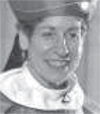
Bishop Jefferts Schori was elected to this office in 2006, for a term lasting until November 2015. She has been vocal about the Episcopal Church’s mission priorities, including the UN Millennium Development Goals, issues of domestic poverty, climate change and care for the earth, as well as the ongoing need to contextualize the gospel. Bishop Jefferts Schori’s career as an oceanographer preceded her studies for the priesthood, to which she was ordained in 1994. She served as Bishop of Nevada before election to this post. Bishop Jefferts Schori grew up in the Seattle area, lived a few years in New Jersey, but has spent most of her life in the West. Bishop Jefferts Schori and her husband, Richard Miles Schori, a retired mathematician (topologist), were married in 1979. They have one daughter, who is a captain (pilot) in the U.S. Air Force.
KEYNOTE ADDRESS
Archbishop Wilton D. Gregory
Archdiocese of Atlanta
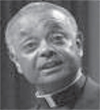
Archbishop Wilton D. Gregory, ordained a priest in Chicago in 1973, earned his doctorate in sacred liturgy at the Pontifical Liturgical Institute (Sant’ Anselmo) in Rome in 1980. Ordained an auxiliary bishop of Chicago in 1983, he was installed as the seventh bishop of the Diocese of Belleville, IL, in 1994. In 2004, Pope John Paul II appointed him as the sixth archbishop of the Archdiocese of Atlanta. Archbishop Gregory was elected president of the U.S. Conference of Catholic Bishops in Nov. 2001. Under his leadership, the bishops implemented the “Charter for the Protection of Children and Young People” in response to the crisis of sex abuse by Catholic clergy. He served on the NCCB Executive and Administrative Committees, the Administrative Board, the Committee on Doctrine and the U.S. Catholic Conference Committee on International Policy. He previously served as the chairman of the Bishops’ Committees on Personnel and the Third Millennium/Jubilee Year 2000 from 1998-2001, and Liturgy from 1991-93.
Archbishop Gregory has written extensively on church issues, including pastoral statements on the death penalty and euthanasia/physician-assisted suicide, and has published numerous articles on the subject of liturgy, particularly in the African-American community. He has also been recognized with a number of honorary degrees and awards, including the Sword of Loyola from St. Louis University in 2004, induction into the Martin Luther King Board of Preachers at Morehouse College, Atlanta in 2006, and also in 2006, the Cardinal Bernardin Award given by the Catholic Common Ground Initiative. He currently serves as Chairman of the Bishops’ Committee for Ecumenical and Interreligious Affairs for the US Conference of Catholic Bishops.
WEDNESDAY BIBLE STUDY
Rev. Dr. Bruce Chilton
Bernard Iddings Bell Professor of Religion at Bard College, Annadale-on-Hudson, NY
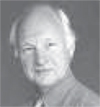
Bruce Chilton is Bernard Iddings Bell Professor of Religion at Bard College, and Rector of the Church of St John the Evangelist. He is an expert on the New Testament and early Judaism, and has contributed fifty books and more than a hundred articles to those fields of study. His principal scholarship has been in the understanding of Jesus within Judaism and in the critical study of the Targumim, the Aramaic paraphrases of the Bible. Jesus appears clearly as a rabbinic teacher in Dr. Chilton’s analysis, on the basis of his study of the Targum of Isaiah, which he has edited and translated in the first commentary ever written on that book.
WEDNESDAY PLENARY ON LOCAL RECEPTION
Speaker: Rev. Dr. William G. Rusch
The Divinity School, Yale University, & New York Theological
Seminary
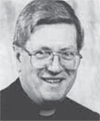
William G. Rusch is a Lutheran pastor who has served as Executive Director of the Foundation for a Conference on Faith and Order in North America and as the Director of the Department of Ecumenical Affairs of the Evangelical Lutheran Church in America. He was a member of several dialogues, the Central Committee of the World Council of Churches, and the Committee on Ecumenical Relations of the Lutheran World Federation.
Rusch was the Jean-Marie Tillard Distinguished Professor of Ecumenical Theology at the Angelicum University in Rome. He has edited or authored 21 books and written over 110 articles on ecumenical and patristic themes. His most recent publications are Ecumenical Reception: Its Challenge and Opportunity, and as editor The Pontificate of Benedict XVI: Its Premises and Promises. His presentation is titled “Ecumenical Reception: Its Challenge and Opportunity for the Churches.” He will describe the concept of ecumenical reception and how and why this topic is before the churches—because of the various dialogues of the last several decades. It will point out that the churches have taken some juridical actions on the basis of the dialogues, but there is much more that the churches, nationally and locally, could now do. The presentation will point out the fragile nature of the present ecumenical moment and conclude with some general suggestions for what could be done locally at this point.
CLOSING LUNCH
Speaker: Rev. Dr. Tom Best
Former Director, Faith and Order Commission, WCC
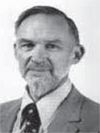
The Church is one, and mission is integral to the nature and life of the Church. Therefore the churches must do mission ecumenically, together rather than separately and in isolation. This is the witness of Luke 24:47-48, and from other Biblical, Patristic, Reformation and Ecumenical sources alike. But what does this mean in the 21st century, in an era when the “old” world seems to be abandoning the Gospel in favor of secularism, and the “new” world remains hostile or indifferent to it? We need urgently an ecumenical mission practice which would make mission an expression of the unity of the Church. Such a practice would call the churches to new levels of mutual accountability, and inspire local congregations to undertake specific, practical acts of common mission.
Rev. Dr. Thomas F. Best, former Director of the Faith and Order Commission of the World Council of Churches, holds the B.A. from Harvard, the M.A. from Oxford, and the Ph.D. from the Graduate Theological Union, Berkeley. In the service of Christian unity he has pursued issues of unity and mission, unity and the churches’ ethical engagement, the vision of the united and uniting churches, issues of liturgy, especially baptism and the eucharist, and the Week of Prayer for Christian Unity. His extensive publications include articles in The Oxford Dictionary of the Christian Church, Die Religion in Geschichte und Gegenwart (RGG), The New SCM Dictionary of Liturgy and Worship, the Dictionary of the Ecumenical Movement, and, most recently, Baptism Today (Liturgical Press) and “Ecclesiology and Ecumenism” in The Routledge Companion to the Christian Church.
Summary
Monday Afternoon Activities
The 2010 National Workshop on Christian Unity began on Monday, April 19th, as participants registered for the Workshop, attended Network meetings and orientations for both new attendees and for various denominational networks.
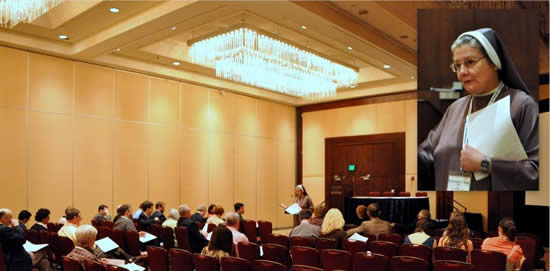
Monday Evening – Opening Worship Service
The evening featured the opening worship service for the National Workshop, at Sacred Heart Catholic Church. National Workshop participants gathered for a service led by both national and regional leaders from many of the denominations taking part in the event.
The homily for the service was given by the Most Reverend Katharine Jefferts Schori, Presiding Bishop and Primate , the Episcopal Church. Preaching on the text of Luke 24:36-53. Bishop Schori, who’s photo appears on the left, called upon participants to follow where Jesus is leading us in the quest for unity, in a manner that truly makes us “witness of these things.”
Among those taking part in the leadership of the service were Archbishop Wilton Gregory (Diocese of Atlanta), Bishop Robert Lynch (Diocese of St. Petersburg), Bishop Timothy Whitaker (Regional Bishop for the Florida Area – United Methodist Church), Bishop Edward Benoway (Bishop, Florida-Bahamas Synod, Evangelical Lutheran Church in America), Bishop Dabney Smith (Southwest Episcopal Diocese), Bishop Charles Leigh (Apostolic Catholic Church), The Rev. Dr. Gerry Tyer (Executive Presbyter of the Presbytery of Tampa), The Rev. Dr. Paige McRight (Executive Presbyter, Presbytery of Central Florida), The Rev. Ted Feilland (President, Florida Fellowship of Community Churches), Presiding Elder Samuel Zakay (Tampa District, African Methodist Episcopal Zion Church), and Mr. Dustin Lemke (Representative, Southeastern Yearly Meeting of Friends). Following the worship service, participants walked to the next block where they took part in a reception at St. Andrew’s Episcopal Church.
Tuesday, April 20th
The Graymoor Breakfast
The day began with a Continental Breakfast hosted by the Graymoor Fathers.
This breakfast has become an annual event that enables participant to share table fellowship with one another, while also avoiding the delays associated with eating at the hotel restaurants or coffee shops.
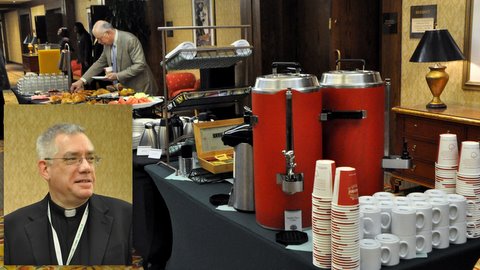
NWCU Keynote Address by Archbishop Wilton Gregory
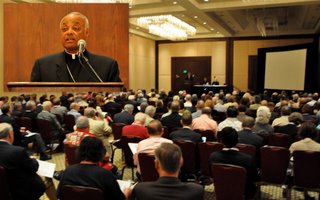
In their first Plenary Session, attendees on Tuesday morning heard the NWCU Keynote Address, which was again sponsored by the Order of St. Lazarus. This year’s Keynote Address was given by Archbishop Wilton D. Gregory, the sixth Archbishop of Atlanta. He has also served as the President of the U. S. Conference of Catholic Bishops, since 2001.. His address included his overview of the current state of relationships between the Roman Catholic church and the other Christian bodies both here in the United States and around the world. We anticipate we will be able to put a copy of his address on this web site within the next two weeks.
Tuesday Morning Seminars
Following the Keynote Address, the participants spent the remainder of the morning taking part in seminars covering a variety of topics. We are setting up a special page to have descriptions and photos from the seminars. We hope to have recordings of the seminars available on that page by the end of the month.
Tuesday Network Luncheons and Afternoon Network Events
The Catholic, Episcopal, Lutheran and United Methodist Networks all conducted luncheon meetings.
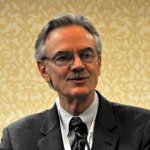
During the afternoon there was a joint Networks Plenary that was hosted by the United Methodist Network. The Plenary heard a presentation by Michael Kinnamon and the Rev. Dr. Gwynne Guibord. They addressed the topic of Christian Witness in an Interreligious world.
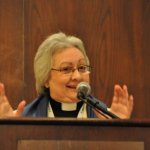
Eucharistic Services
Tuesday evening two Eucharistic Services were held. Members of CADEIO hosted a Catholic service at the Sacred Heart Church, and a Eucharistic Service was held by the Episcopal Church (at St. Andrews Church) for those denominations who have full or interim communion agreement.
Wednesday, April 21st
NCCC BREAKFAST
Wednesday morning’s activities began with a breakfast sponsored by the National Council of Churches. Like the Graymoor Breakfast, this NCCC breakfast has become a much appreciated opportunity for participants to have time for fellowship over breakfast, to avoid the restaurant lines and delays, and to hear a brief update of the state the NCCC’s current life and work. A brief presentation was made by NCCC General Secretary, Dr. Michael Kinnamon.
Dr. Clare J. Chapman, Deputy General Secretary and Chief Operating Officer for the NCCC, made a brief presentation about the Circle of Names project through which people can recognize women who have inspired others in their own journey of faith. To learn more about this program and to recognize some woman who has helped to inspire you in your faith journey, click on the image to the right.
Wednesday Morning Bible Study
Following the NCCC Breakfast, the NWCU participants took part in a Bible Study led by the Rev. Dr. Bruce Chilton, Bernard Iddings Bell Professor of Religion at Bard College. In his address entitled, Generation of the Eucharist in the New Testament, he examined the five step process through which the Last Supper developed into the Eucharist. Drawing upon his advanced understanding of the Biblical languages, and of the other languages common in the Holy Land at the time of Christ, he carefully explained how the Biblical account found in the New Testament reflected the cultural and religious understanding of the first century and how that understanding helps us as we seek to be guided by those accounts. || Eucharist and the Mimesis of Sacrifice by Dr. Chilton on Eucharist
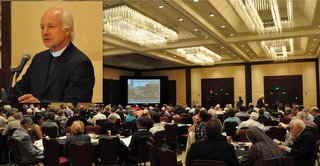
Ecumenical Reception: Its Challenge and Opportunity
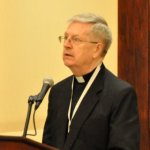
Longtime friend of the NWCU, the Rev. Dr. William G. Rusch, who is currently teaching classes at the Divinity School, Yale University and New York Theological Seminary presented a careful presentation examining the process of Ecumenical Reception and how it is and is not taking place in our religious communities. He examined the necessity of moving beyond the processes of Dialogue and Agreement, to the steps necessary if those Agreements are to have an impact upon the life and work of the church.
Luncheon and Table Talk
At noon on Wednesday, Workshop participants were served lunch in the room where we had heard the two above presentations, and engaged in a process of reflecting upon Bill Rusch’s presentation and how ecumenical leaders can work together to further the process of reception in churches and regions in which we serve. For purposes of that discussion, tables were assigned based upon the zip codes from which we came, and those table assignments were indicated on our name tags. It gave us an opportunity to do some initial thinking about how we can help to make the process of reception work.
Bible Study, Part Two
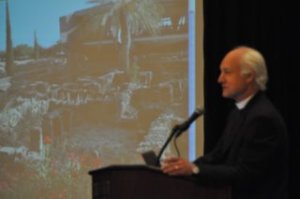
Following the table discussion of the process of reception, Dr. Bruce Chilton returned to present the second half of his presentation, Generation of the Eucharist in the New Testament. || Eucharist and the Mimesis of Sacrifice by Dr. Chilton on Eucharist
Network Seminars and Plenary Meeting
Following the post luncheon Bible Study, most participants took part in their particular Network functions.
Young Ecumenists—A Growing Interest in Christian Unity
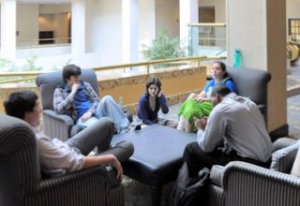
At this years NWCU, we experienced a growing number of young ecumenists, anxious to learn more about how they can give expression to their own vision of Christian Unity. They engaged with more experienced members of denominational networks, and spent time sharing knowledge with their own peers. In the photo on the right a group is gathered to share time together.
Among the participants were three young women from Hastings College in Nebraska. Unhappy with the state of campus ministry available to them, they went to the administration of the Presbyterian Church (USA) related college, and the school decided to sponsor their participation in the National Workshop on Christian Unity.
Another group present at the workshop is the New Fire movement. The New Fire gathering is a Christian ecumenical forum for current and future young adult leaders of different communions/denominations and ecumenical initiatives, which establishes a common space for relationship building, ecumenical education and formation, leadership training, sharing of resources and best practices and for strategic planning.
New Fire participants are especially committed to empowering cooperative networks of local, grassroots young adult ecumenical initiatives that can connect to the larger facilitating bodies of the National Council of Churches, Church World Service, World Council of Churches and the World Student Christian Federation.
Wednesday Evening Cultural Event: Night at the Aquarium
A regular feature of the National Workshop on Christian Unity is to set aside one evening as a time when participants can just relax and enjoy some aspect of the community where we are holding the workshop. Friendships are renewed or deepened. The 8 am to 9 pm scheduling of meetings and workshops is interrupted so we can just enjoy having a good time, together.
For this years event, many of the workshop participants choose to visit the Florida Aquarium, with participants having the entire aquarium to ourselves. They visited the exhibits, enjoyed a buffet dinner, and learned about both the deep see underwater life and the life in the freshwater ecosystem that is unique to Florida.
Thursday, April 22nd
Thursday Morning Seminars
In a departure from previous years, instead of having morning seminars on Tuesday, Wednesday and Thursday, this year’s workshop had seminars on Tuesday and Thursday (two session on Thursday).
Closing Address by Dr. Thomas Best and Closing Luncheon
The closing address of the National Workshop on Christian Unity was given by Dr. Thomas Best. Dr. Best is the former Director of the Faith and Order Commission of the World Council of Churches. In his address, he called the church to move beyond issues or recognition to mutual accountability.
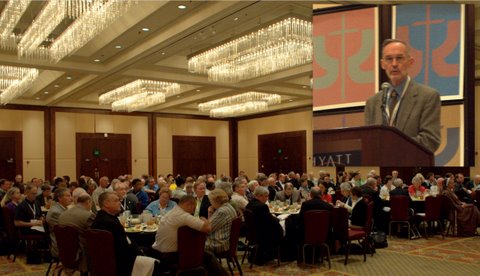
Following his address, the participants enjoyed a closing meal as they prepared for the return to their various communities and places of ministry.
At the close of the dinner, National Chair, Donald McCord, chair of the National Ecumenical Officers Association, thanked the leaders for this event, the Rev. Don Rooney – National Planning Committee Chair, and the Rev. Russell – Local Planning Committee Chair, for their outstanding efforts in helping this years event succeed. He then introduced the leadership for next year’s event, the Rev. Norman Theiss – Chair of the National Planning Committee and the Rev. Donald Green – Local Planning Committee (Pittsburgh).
